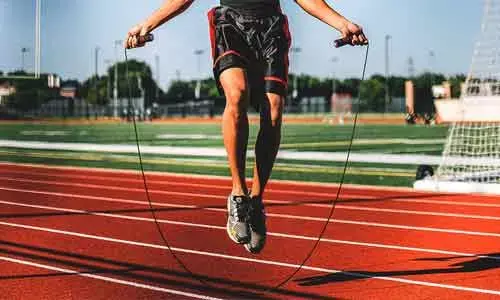- Home
- Medical news & Guidelines
- Anesthesiology
- Cardiology and CTVS
- Critical Care
- Dentistry
- Dermatology
- Diabetes and Endocrinology
- ENT
- Gastroenterology
- Medicine
- Nephrology
- Neurology
- Obstretics-Gynaecology
- Oncology
- Ophthalmology
- Orthopaedics
- Pediatrics-Neonatology
- Psychiatry
- Pulmonology
- Radiology
- Surgery
- Urology
- Laboratory Medicine
- Diet
- Nursing
- Paramedical
- Physiotherapy
- Health news
- Fact Check
- Bone Health Fact Check
- Brain Health Fact Check
- Cancer Related Fact Check
- Child Care Fact Check
- Dental and oral health fact check
- Diabetes and metabolic health fact check
- Diet and Nutrition Fact Check
- Eye and ENT Care Fact Check
- Fitness fact check
- Gut health fact check
- Heart health fact check
- Kidney health fact check
- Medical education fact check
- Men's health fact check
- Respiratory fact check
- Skin and hair care fact check
- Vaccine and Immunization fact check
- Women's health fact check
- AYUSH
- State News
- Andaman and Nicobar Islands
- Andhra Pradesh
- Arunachal Pradesh
- Assam
- Bihar
- Chandigarh
- Chattisgarh
- Dadra and Nagar Haveli
- Daman and Diu
- Delhi
- Goa
- Gujarat
- Haryana
- Himachal Pradesh
- Jammu & Kashmir
- Jharkhand
- Karnataka
- Kerala
- Ladakh
- Lakshadweep
- Madhya Pradesh
- Maharashtra
- Manipur
- Meghalaya
- Mizoram
- Nagaland
- Odisha
- Puducherry
- Punjab
- Rajasthan
- Sikkim
- Tamil Nadu
- Telangana
- Tripura
- Uttar Pradesh
- Uttrakhand
- West Bengal
- Medical Education
- Industry
Exercise-only strategy not good enough for BP control in young adults, study suggests

UK: Recent research published in The Lancet e-Clinical Medicine does not support the use of medium-to-high intensity aerobic exercise training as the sole method of controlling blood pressure in young adults.
Exercise is recommended for young people with high blood pressure, but no trials have been conducted to determine its effectiveness at this age. As a result, Wilby Williamson and colleagues undertook this study to see if aerobic exercise, self-monitoring, and motivational coaching decrease blood pressure in this population.
The study was a two-arm, single-center, parallel superiority randomized clinical trial with open community-based enrollment of physically inactive 18-35 year old persons with awake 24 h blood pressure of 115/75mmHg-159/99mmHg and BMI of 35 kg/m2. The research was carried out at the John Radcliffe Hospital's Cardiovascular Clinical Research Facility in Oxford, UK.
Participants were randomized (1:1) to the intervention group, which received 16 weeks of aerobic exercise training (three aerobic training sessions per week of 60 minutes per session at 60-80 percent peak heart rate, physical activity self-monitoring with encouragement to do 10,000 steps per day, and motivational coaching to maintain physical activity upon completion). The control group was directed to hypertension education materials and lifestyle recommendations.
The researchers doing the statistical analysis were not aware of the group allocation. On an intention-to-treat basis, the primary outcome was the change in 24 h awake ambulatory blood pressure (systolic and diastolic) from baseline to 16 weeks. Enrollment happened between 30/6/2016 and 26/10/2018.
The key findings of this study were as follows:
1. 178 of the 203 randomized young adults completed the 16-week follow-up, while 160 completed the 52-week follow-up.
2. There were no differences in awake systolic or awake diastolic ambulatory blood pressure between groups.
3. At 16 weeks, aerobic exercise enhanced peak oxygen consumption and peak wattage. At 52 weeks, there were no intervention effects.
In conclusion, an exercise-only strategy did not decrease blood pressure in young individuals with high blood pressure.
Reference:
Williamson, W., Lewandowski, A. J., Huckstep, O. J., Lapidaire, W., Ooms, A., Tan, C., Mohamed, A., Alsharqi, M., Bertagnolli, M., Woodward, W., Dockerill, C., McManus, R., … Leeson, P. (2022). Effect of moderate to high intensity aerobic exercise on blood pressure in young adults: The TEPHRA open, two-arm, parallel superiority randomized clinical trial. In eClinicalMedicine (Vol. 48, p. 101445). Elsevier BV. https://doi.org/10.1016/j.eclinm.2022.101445
Neuroscience Masters graduate
Jacinthlyn Sylvia, a Neuroscience Master's graduate from Chennai has worked extensively in deciphering the neurobiology of cognition and motor control in aging. She also has spread-out exposure to Neurosurgery from her Bachelor’s. She is currently involved in active Neuro-Oncology research. She is an upcoming neuroscientist with a fiery passion for writing. Her news cover at Medical Dialogues feature recent discoveries and updates from the healthcare and biomedical research fields. She can be reached at editorial@medicaldialogues.in
Dr Kamal Kant Kohli-MBBS, DTCD- a chest specialist with more than 30 years of practice and a flair for writing clinical articles, Dr Kamal Kant Kohli joined Medical Dialogues as a Chief Editor of Medical News. Besides writing articles, as an editor, he proofreads and verifies all the medical content published on Medical Dialogues including those coming from journals, studies,medical conferences,guidelines etc. Email: drkohli@medicaldialogues.in. Contact no. 011-43720751


